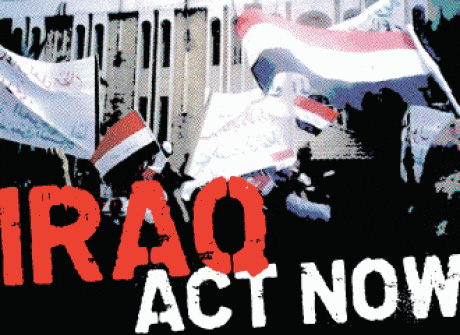
BAGHDAD, Iraq (PAI) – Though an Iraqi judge has tossed out trumped-up charges against a leading Iraqi union leader, progress on enacting a new trade union law there is still stalled, a top trade union confederation reports.
The deadlock has led IndustriALL, the international confederation that includes several U.S. unions, to call for a worldwide e-mail campaign to Iraqi leaders demanding passage of a new, more-liberal law to replace the Saddam Hussein-era statute.
The state of Iraqi unionists’ freedom, including their right to organize, is important as part of the overall mosaic of reasons the U.S. says it wants as a result of George W. Bush’s Iraq War. But neither the post-war U.S.-run administration there nor the subsequent Iraqi government of Prime Minister Nouri al-Maliki has changed the current 26-year-old repressive law.
Keeping Hussein’s law was a direct decision by al-Maliki himself, says Iraqi oil workers union leader Hassan Juma’a, who spoke to unionists during the AFL-CIO convention in Los Angeles in September. Blogger Owen Tudor reported the charges against Juma’a, after pending for three months, were dropped on Nov. 10.
“The Second Criminal Court in Basra confirmed that, without evidence, the Iraqi government couldn’t keep dragging Hassan to court, and threw the charges out again,” Owen told LaborStart. “Hassan sent a message of thanks to his supporters in the trade union movement globally and in particular in the U.S., where he attended the AFL-CIO convention. The campaign goes on to get the charges against his fellow trade unionists discharged as well.”
But Hussein’s labor law survives, and it bans unions from state-run enterprises, which are 80 percent of Iraq’s economy.
“It is appalling that Saddam was brought down but his notorious Public Law 150, banning all trade union activity in the public sector, remains in force and Iraq is still without a legal framework for industrial relations that meets ILO standards. Iraqi Labour legislation, as presently enforced, denies unions and their members basic rights,” IndustriALL said.
IndustriALL Assistant General Secretary Kemal Ozkan recently discussed the proposed union law with Iraqi Parliament Speaker Osama Al-Nujaifi, Labor Minister Nassar Al-Rubuiee, and parliamentary Labor Committee Chairman Kanna Yonadam.
Ozkan “made it clear the new law must cover the public sector,” IndustriALL said. “Legislation should also make it easier to form a union by ensuring that requirements follow International Labour Organization norms and standards – trade unions must be allowed to determine and establish their own democratic structures, and the law must provide effective guarantees against interference in the trade union movement’s activities by government and employers.”
IndustriALL also posted a letter on its website to be emailed to Al-Nujaifi and Al-Rubuiee, demanding passage of the new trade union law to replace Hussein’s law.
“We strongly urge parliament to move forward on the basis of the input from the trade unions, as well as the ILO, to ensure that any new legal framework affords workers their rights under international law,” it says.
The letter adds that IndustriALL fears Iraq’s parliament could enact a labor law, but not a parallel trade union law, leaving the 1987 trade union law in force. Doing that would mean, “divesting the majority of Iraqi workers of their fundamental rights. Finally, we would urge that any final draft of either law be made available to the trade unions for a final review and comments before any action,” the letter concludes.












Comments